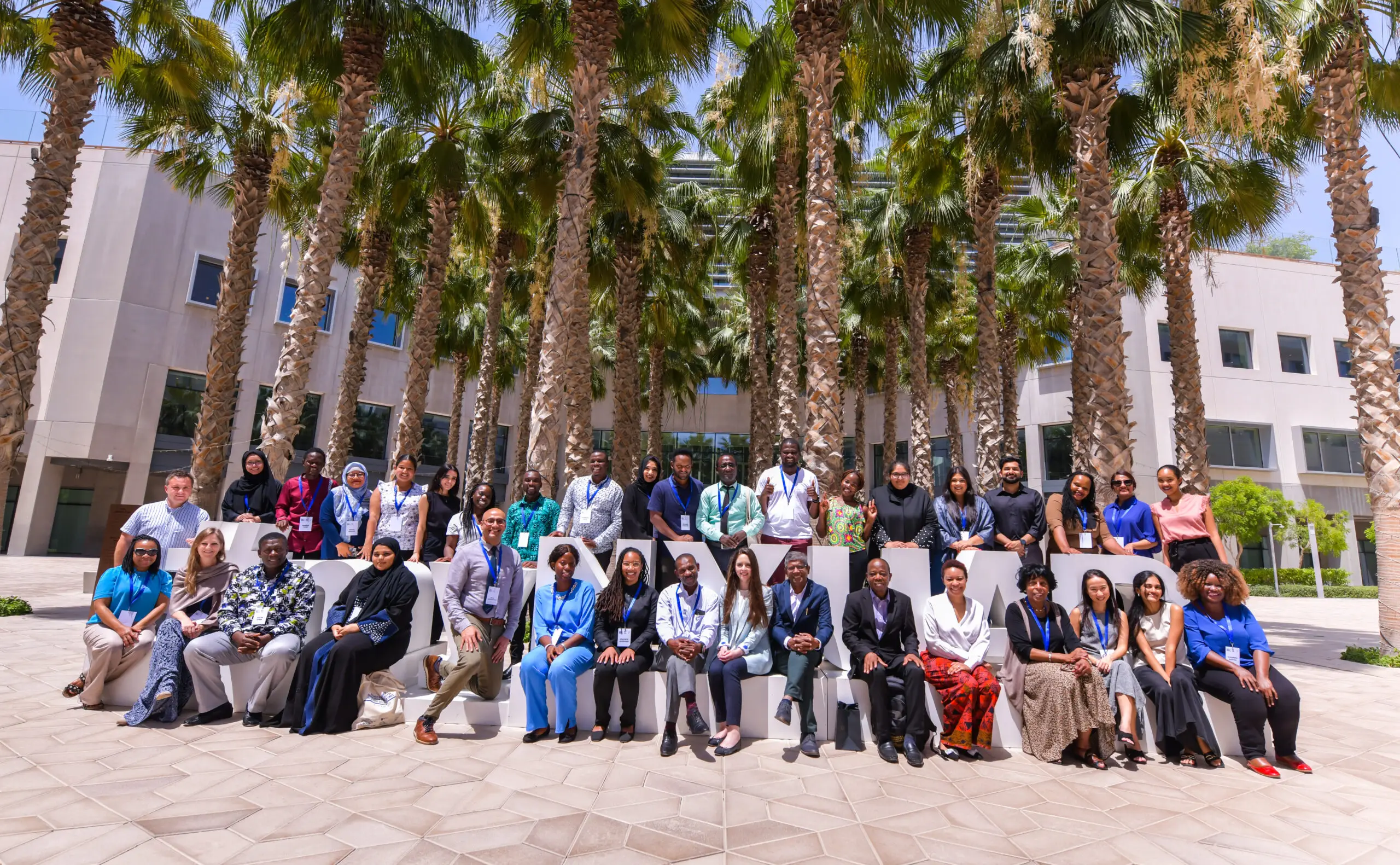Inspiring a New Generation of Disease Elimination Researchers
By Dr Ngozi Erondu

Infectious diseases continue to pose a significant global health challenge, impacting the stability, prosperity and well-being of individuals, communities and entire nations. Malaria alone affected 249 million people in 2022, while other diseases that we have the means to eliminate, like river blindness, lymphatic filariasis, and even polio stubbornly persist and continue to threaten lives. These diseases are smart. They quickly evolve to avoid the latest scientific advancement threatening their existence, and they transcend geographical and political boundaries. To eradicate them will require innovative research, sustained funding, and global collaboration.
GLIDE is at the forefront of this transformative effort. Through initiatives like the Falcon Awards for Disease Elimination, GLIDE champions early-stage research, providing critical funding that empowers young scientists to explore novel ideas and bring fresh perspectives to disease elimination strategies. Through our recently launched Injaz Fellowship, we support the development of leadership skills in mid-career professionals, equipping them with the tools and resources necessary to lead impactful projects within their communities, particularly in regions burdened by neglected tropical diseases. GLIDE’s Disease Elimination and Eradication Course (DEEC) collaborates with institutions like The Carter Center, the University of Global Health Equity (UGHE) in Rwanda, and the Noguchi Memorial Institute for Medical Research (NMIMR) in Ghana to expand access to cutting-edge education, enhancing the capacity of public health professionals worldwide to implement effective disease elimination strategies. Together, these initiatives form a supportive ecosystem to foster innovation, build leadership in disease elimination, and enhance scientific capabilities in and out of the laboratory, steering us toward a healthier, more equitable world.
The Falcon Awards for Disease Elimination is a grant program designed to empower young and emerging scientists to reach their goals and help partners go further and faster in their elimination efforts. Since 2021, the Falcon Awards have provided funding to support 13 research projects aimed at advancing the elimination of GLIDE’s current four focus diseases: malaria, polio, onchocerciasis, and lymphatic filariasis. In 2023, Salum Azizi, a Research Entomologist at Kilimanjaro Christian Medical University College, received the award for his study looking at the importance of community-led surveillance and response to advance elimination efforts of lymphatic filariasis (LF) in the context of climate change in north-eastern Tanzania. His project addressed crucial gaps in conventional surveillance and highlighted community-based strategies for controlling LF transmission, making a tangible impact on disease elimination efforts in the region.
Each project like Salum’s marks a step toward the elimination of these diseases that impact millions worldwide. Unlike conventional funding sources, the Falcon Awards specifically provide smaller grants that enable grantees to explore novel or untested approaches, filling crucial data gaps or testing the feasibility of new ideas. This targeted approach not only speeds up the research process but also ensures that the outcomes are directly aligned with the strategic objectives of disease elimination.
In 2023 the second year of the awards, “The Climate Edit,” focused on the intersection of climate change and infectious diseases. Nine winners were selected for their innovative research exploring indirect facets of climate change on community health that are not yet well understood. Amongst them, Dr Therese Shema Nzayisenga, Director and Founder of the Climate Justice Foundation, shared her enthusiasm about the importance of new channels of funding:
Being granted this funding was beyond exhilarating! Such grants, independent of political inclination, have the ability to bring to light what is happening in the communities and provide numbers that do not seek a certain goal or aim to show a certain picture. In addition, this award inadvertently promotes cross border collaboration especially in the time and age where being a global citizen makes it all the easier to achieve disease elimination.
The 2024 Falcon Awards focus on accelerating disease eradication in the Western Pacific Region, and selected five formative research projects and one advocacy initiative. While the region presents challenges, its unique island geography offers promising opportunities for eliminating diseases, as shown by previous successes with other infectious and neglected tropical diseases. GLIDE aims to tap into this potential by funding research to uncover new strategies and fill crucial knowledge gaps. Through this funding, we hope to empower in-country partners to raise awareness for disease elimination and generate the necessary social and political commitment underpinning all successful disease elimination efforts.
Dr Nzayisenga, GLIDE’s youngest ever winner offered advice for other scientists who might be thinking of applying:
Go for it! Don’t let how big your own dreams are intimidate you or anyone around you. A little over a century ago, we believed most infectious diseases were incurable, but thanks to research we are speaking about elimination. Our world can and will be disease free. We just need to put in the work to get there.
While the Falcon Awards champion action-oriented research and advocacy, GLIDE’s Injaz Fellowship continues the drive to foster the next generation of leaders. Launched in 2024, ‘Injaz’ means ‘achievement’ in Arabic and perfectly captures the spirit of this program, equipping passionate individuals with the skills and resources needed to implement impactful projects.
In addition to this, our Disease Elimination and Eradication Course (DEEC) aims to empower potential global health leaders with essential skills needed to eliminate infectious diseases. Initially a partnership with the New York University School of Global Public Health and New York University Abu Dhabi, we have expanded the partnership to The Carter Center, University of Global Health Equity (UGHE) in Rwanda, and Noguchi Memorial Institute for Medical Research (NMIMR) in Ghana. Targeting diverse participants from NTD-endemic African countries and beyond, this course is transdisciplinary, multi-institutional and has been created to facilitate collaborative learning and the co-development of disease elimination strategies among disease program managers, researchers, entomologists, policymakers, and others.
The course connects a diverse group of health professionals, allowing them to practice vital skills like resource allocation and community engagement in real-world scenarios, broaden their networks, and make a global impact. In an ever-changing world where new challenges continue to emerge, disease elimination strategies must evolve to maintain the momentum towards disease elimination and eradication efforts. The DEEC now incorporates sessions on how to handle interruptions in disease elimination efforts caused by global health emergencies, a new module inspired by recent worldwide events. This has proven crucial in preparing participants to maintain progress on disease elimination and eradication amidst unforeseen challenges.
To enhance course accessibility and diversity, the 2024 iteration of DEEC was held in Rwanda and Ghana, featuring country teams from nine different nations in each course. The culmination of the course is when participants design their own innovative strategies to eliminate a specific disease from their country, using the new skills and information from DEEC. This year, participants’ strategies included not only integrated approaches, leveraging the synergies between NTD and other infectious disease programs for more effective outcomes, but also collaborative approaches to addressing cross-border challenges. At the end of the course, each country team presented their disease elimination strategies to a panel of global health experts. Their presentations incorporated core DEEC concepts such as systems thinking, human-centred design, and behavioural theories. Country teams from Liberia and Pakistan, which secured first place with their strategies on river blindness and vaccine-preventable diseases respectively, will receive seed funding from GLIDE & The Carter Center to catalyze their efforts.
The course was well received by participants in Rwanda and Ghana with 100% of participants reporting that DEEC increased their understanding of disease elimination and eradication and helped them learn new ways of planning interventions for disease elimination and eradication. To date, DEEC has reached over 130 participants from 30 countries, helping facilitate cross-country learnings, collaboration, and coordination.
Beyond the individual successes of each DEEC graduate, each Injaz Fellow and each Falcon awardee, the combined impact of their work demonstrates the power of global collaboration in public health.
It is GLIDE’s ambition to continue nurturing the skills that drive progress toward disease elimination. Looking ahead, we aim to expand our reach and deepen our impact, bringing our programs to more regions and more professionals around the world continue to bring us closer to our disease elimination goals.
Learn more about how GLIDE is supporting the shift towards a world free from infectious diseases of poverty by exploring and engaging with our programs. Whether you are a researcher, health professional, or a global health advocate, we are all united in our pursuit of health for all. Together, let’s work towards this shared vision, leveraging our strengths and resources to make lasting impacts on global health.

Technical Director, GLIDE
Dr Ngozi Erondu, PhD MPH, brings 15 years of experience in research, policy, and practice to GLIDE, where she manages the Technical Team and serves on the Leadership Team. In addition to formerly holding academic appointments at the London School of Hygiene and Tropical Medicine and the O’Neill Institute for National and Global Health Law at Georgetown University, she has also worked with organizations such as the United States Centres for Disease Control, the World Health Organization, and the United Kingdom Health Security Agency (formerly Public Health England). Specializing in infectious disease epidemiology, she has worked extensively across 40+ countries in Africa, Europe, the Middle East, and Southeast Asia, strengthening disease surveillance systems and enhancing health system components like immunization programs and laboratory health information systems.
Dr Erondu is an active voice in shaping global health policy and governance; she currently is the co-Chair of the O’Neill-Lancet Commission on Racism and Structural Discrimination and a Fellow by Distinction of the UK Faculty of Public Health. She also is an Associate Fellow at Chatham House (the Royal Institute of International Affairs), and an alumni fellow at Johns Hopkins University and the Aspen Institute.